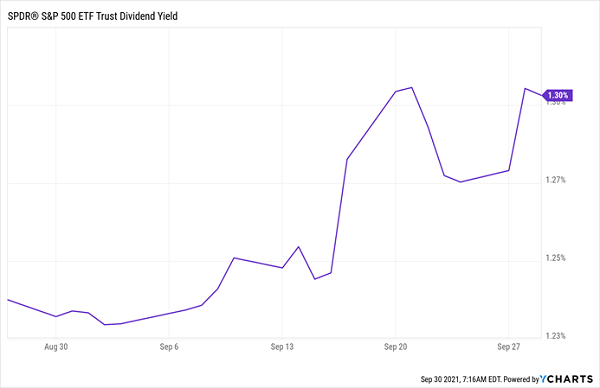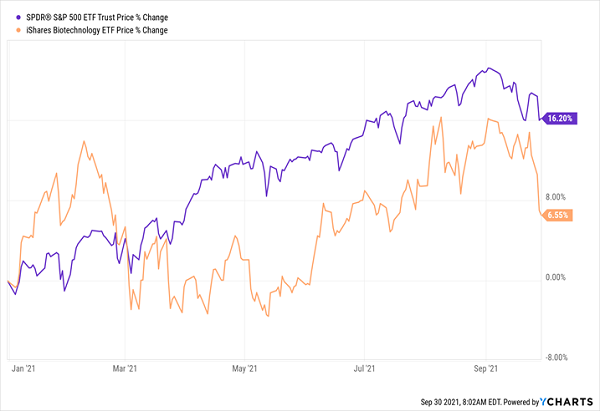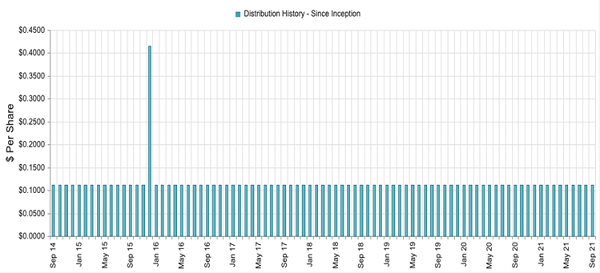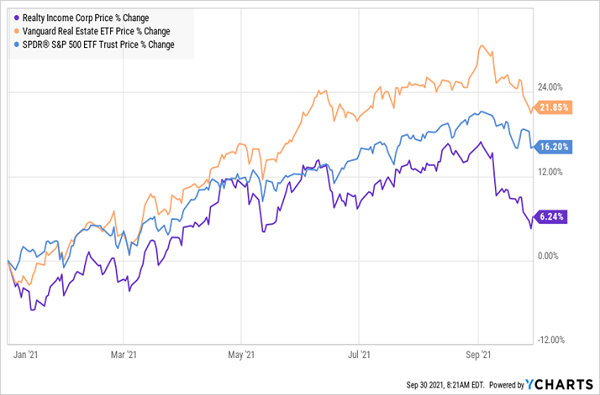Let’s jump on the market’s September slide and grab ourselves a sweet “double discount” on 358 totally ignored income plays—and some sweet 6%+ dividends, too. And our new income stream will pay us monthly!
Going Where Other Dividend Investors Don’t
Our route to this big monthly payout does an end run around the misers of the S&P 500. Even though the market dove 3.5% in September, that was only enough to drive yields on the big-name stocks up by—wait for it—0.07%.
In other words, if you dropped a million bucks into an ETF like the SPDR® S&P 500 (NYSE:SPY) in early September, you’d be generating $12,300 in yearly dividends.
And if you waited and grabbed a “deal” at the end of the month, your income stream would have risen to…$13,000. Spread your extra $700 out over a year and you can buy yourself an extra coffee a day!
Buying The September Dip Failed To Pay Off For Income Seekers

So let’s skip the big names. They just don’t pay enough! And they certainly won’t pay us monthly. For that, we’ll look to lesser-known yield plays like real estate investment trusts (REITs) and closed-end funds (CEFs).
Cashing In On Lazy First-Level Thinking
Let’s stop here for a second, because it’s vital that we don’t make the mistake of associating “lesser known” with “low quality.” Too many folks think that way—and it’s why many are forced to scrape by with yields that are being lapped (often two or three times over) by today’s high inflation.
Truth is, REITs and CEFs are among the best places to get high, safe dividends and bargains, too. Every income investor should own one or both asset classes. This realization alone puts us one step ahead of the rest of the crowd.
Consider CEFs, which yield around 6.2%, on average, today, or about $62,000 in dividends on a million-dollar investment. And of the 460 or so CEFs out there, 288 trade at discounts to net asset value (NAV, or the value of their portfolios) and 358 pay dividends monthly!
Those monthly payouts are manna for retirees because they take that $62,000 in dividend income and break it out into nice, predictable $5,167 monthly payouts that roll in steadily, right in line with your bills.
REITs, too, are known for above-average dividends. And while the sector isn’t as flush with monthly payers as CEFs are, there are some standouts, like 4.3%-yielding mall landlord Realty Income (NYSE:O)—more on that one below—warehouse REIT STAG Industrial (NYSE:STAG), and senior-care facility manager LTC Properties (NYSE:LTC).
Let’s pull out two specific corners of the REIT and CEF markets (complete with names and tickers) that are worth taking a close look at now.
1. Bargain Monthly Dividend Play: Healthcare CEFs
Pharma stocks might not jump out as bargains, with COVID-19 putting them in the spotlight over the last couple years, but they’ve actually trailed the market in 2021. Consider the pharma benchmark iShares Nasdaq Biotechnology ETF (NASDAQ:IBB), in orange below, which is well behind SPY, in purple:
Pharma Lags, Our Opportunity Arrives
This is the first part of our “double discount” in the sector. To get the second, we’ll look to a CEF called the Tekla Healthcare Opportunities (NYSE:THQ). It yields 5.9% as I write this and holds big-name drug and medical-device makers, such as Johnson & Johnson (NYSE:JNJ), Abbott Laboratories (NYSE:ABT), AbbVie (NYSE:ABBV) ,and Thermo Fisher Scientific (NYSE:TMO).
The fund delivers the second part of our double discount with its 5% markdown to NAV, which is a sweet deal in this (still) overbought market, especially considering that THQ traded at a 2.6% premium as recently as June.
So how does that translate into upside?
A 2.6% premium would boost the fund’s price by around 7.5%, and that’s before any jump in its portfolio value (which is a certainty, in my view, given these stocks’ attractive valuations and locked-in demand for their products in the years ahead).
So if we’re dropping, say, $50K into THQ, we can think of its 7.5% discount-driven upside as a $3,750 bonus before our real gains start—and a sweet “add-on” to the 5.9% monthly dividend we’re getting.
And this payout is as steady as they come: it’s hummed along, rolling in every month since THQ’s launch in 2014:
THQ’s Steady Monthly “Paychecks” Roll In
Source: CEF Connect
Now let’s take a look at a monthly paying REIT that’s been unfairly beaten down in the market’s September slide.
2. Bargain Monthly Dividend Play: Mall REITs
Despite last month’s turbulence, REITs have soared this year, with returns tracking well ahead of the S&P 500. But one corner of the REIT market is still cheap: mall landlords.
Check out how Realty Income Corp (NYSE:O), a stock so devoted to monthly dividends it bills itself as the “monthly dividend company,” has lagged the S&P 500 (in blue) and the Vanguard Real Estate Index Fund ETF Shares (NYSE:VNQ), in orange:
REITs Revive, But Mall Owner Lags 
You might be surprised to hear me talking up mall REITs; after all, I’ve spent the last few years going on about how they’re getting crushed by Amazon.com (NASDAQ:AMZN) and its ilk.
My view hasn’t changed. That’s why I only recommend holding retail REITs for the short term—over the next six to 12 months, say—as the reopening hits its stride. The Delta variant has delayed things somewhat, but that only extends our opportunity here.
And Realty Income, which yields 4.3% today, has a business model nicely suited to the months ahead. The REIT rents standalone buildings to tenants who take on the taxes, maintenance, and insurance costs themselves. It’s a savvy approach that frees up the REIT from extra costs. That’s a particularly important advantage in a time of rising inflation.
That, plus the wide range of retailers it rents to, has helped Realty Income bounce back from the pandemic: rent collections were up to 99.4%, as of the end of the second quarter. Management also recently increased its forecast adjusted per-share funds from operations (FFO, the main REIT cash flow metric) for 2021. The new range of $3.53 to $3.59 a share is up 4% to 6% from 2020.
Despite that, Realty Income trades 20% below pre-pandemic highs. That’s too low for a REIT renowned for growing its payout every quarter and paying a 4.3% dividend that’s well supported by FFO: the current annualized monthly dividend comes in at a conservative (for a REIT) 79% of the midpoint of this year’s forecast adjusted FFO.
Disclosure: Brett Owens and Michael Foster are contrarian income investors who look for undervalued stocks/funds across the U.S. markets. Click here to learn how to profit from their strategies in the latest report, "7 Great Dividend Growth Stocks for a Secure Retirement."
